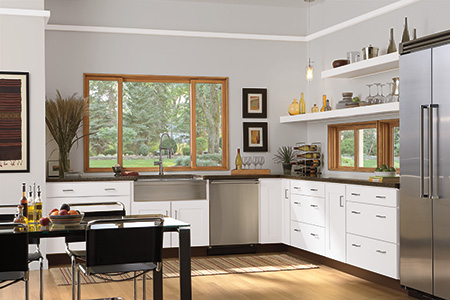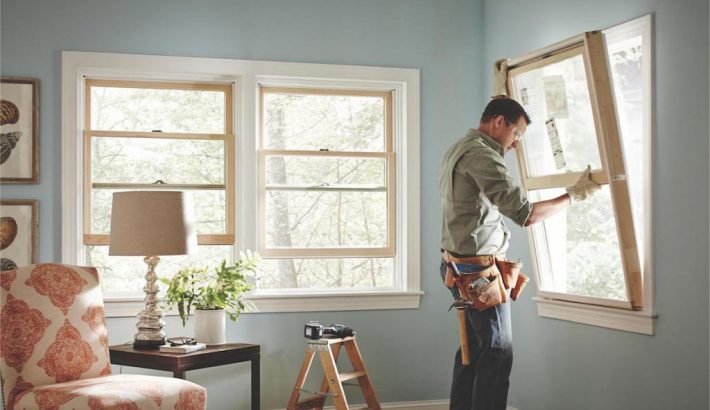Upgrade Your Home With Energy-Efficient Home Window Substitutes
In the world of home improvement, the choice to upgrade to energy-efficient window substitutes can dramatically influence both the capability and looks of a residence (Jersey Village window replacement). As homeowners seek ways to enhance the performance and sustainability of their home, the option of windows plays a crucial duty in attaining these objectives. Past the surface area level of plain visual appeals, energy-efficient windows offer a wide range of advantages that surpass mere curb allure. With a careful option procedure that takes into consideration different factors, from glass types to installment strategies, beginning on this home upgrade journey might confirm to be a transformative undertaking.
Benefits of Energy-Efficient Windows

The installation of energy-efficient home windows gives substantial cost savings on utility expenses while boosting ecological sustainability. Energy-efficient windows are developed to decrease heat loss and gain, decreasing the requirement for home heating and cooling down systems to burn the midnight oil. By effectively insulating the home, these home windows aid maintain a comfy interior temperature year-round, leading to reduced energy intake and lowered energy prices. Additionally, energy-efficient home windows can help manage wetness levels within the home, minimizing the threat of mold and mildew and mildew development.
Past the monetary benefits, energy-efficient home windows contribute to environmental sustainability by lowering carbon discharges connected with power manufacturing. In general, investing in energy-efficient windows not just enhances the convenience and effectiveness of a home but additionally straightens with ecologically conscious practices.
Sorts Of Energy-Efficient Glass
Numerous advanced sorts of energy-efficient glass offer unique residential or commercial properties that deal with different requirements and choices in enhancing the sustainability and effectiveness of buildings. Low-emissivity (Low-E) glass is a prominent alternative created to lessen the quantity of ultraviolet and infrared light that can go through the glass, thereby reducing warmth transfer. This type of glass aids preserve a regular indoor temperature level, decreasing the demand for home heating or cooling down systems, and ultimately decreasing energy costs. Another ingenious option is spectrally discerning glass, which permits visible light to go through while obstructing specific types of infrared radiation. This aids in preserving a comfy indoor environment while lessening heat gain. Triple-pane glass, including 3 layers of glass with protecting gas between them, provides boosted thermal insulation, making it extremely energy-efficient. Furthermore, self-cleaning glass with an unique covering that breaks down and loosens up dirt when revealed to sunlight can minimize upkeep demands and maintain windows looking tidy. Each type of energy-efficient glass uses distinct benefits, enabling house owners to select one of the most appropriate choice based on their specific demands and objectives.
Factors to Consider When Picking
When pondering energy-efficient window substitutes, it is imperative to very carefully analyze specific aspects that straighten with your sustainability objectives and wanted power savings. One crucial aspect to consider is the home window's power efficiency rankings, such as the U-factor and Solar Warm Gain Coefficient (SHGC) The U-factor actions exactly how well the window insulates, with reduced numbers showing far better insulation, while the SHGC indicates the window's capability to block warmth from sunlight. Additionally, the home window frame product plays a considerable duty in energy ventrolla windows efficiency. Products like fiberglass, vinyl, or wood with thermal breaks are outstanding options for lowering warm transfer. An additional crucial factor to consider is the window style and orientation concerning sunlight exposure. Choosing the right home window design and tactically putting them can make best use of natural light while lessening warm gain or loss. Last but not least, installment high quality is key to ensuring the home windows perform as meant. Correct setup aids prevent air leakage, guaranteeing optimum power performance. By thoroughly evaluating these variables, you can choose energy-efficient windows that boost convenience, reduce energy costs, and profit the visit our website environment.
Installation and Upkeep Tips

Routine upkeep is crucial to protecting the efficiency of your energy-efficient home windows. Inspect the home windows occasionally for any kind of indications of wear, damages, or sealer degeneration. Clean the structures, tracks, and glass routinely making use of light soap and water to eliminate dirt and grime that can affect efficiency. Inspect the weather-stripping and seals for any kind of tears or gaps and change them if needed to keep the windows' power effectiveness.
Additionally, lubricate moving components such as hinges and locks to make sure smooth procedure. By adhering to these installation and maintenance tips, you can boost the power efficiency of your home and prolong the lifespan of your energy-efficient home windows.
Cost-Benefit Analysis of Updating

Energy-efficient home windows are developed to lessen heat transfer, lowering the need for heating and cooling down systems to burn the midnight oil. This can result in significant savings on power expenses, specifically in areas with severe temperatures. Furthermore, energy-efficient windows can enhance the total value of your home, making it a lot more attractive to possible customers if you choose to market in the future.
When computing the Check This Out cost-benefit evaluation, consider the possible cost savings on power bills, any available rewards or refunds, and the lifespan of the windows. While the initial cost may be higher, the long-term cost savings and benefits of energy-efficient windows make them a wise financial investment for property owners seeking to boost their residential or commercial property's power performance and value.

Verdict
In verdict, updating to energy-efficient window substitutes supplies countless advantages such as decreased power intake, boosted comfort, and cost savings. By picking the suitable type of energy-efficient glass and considering variables like structure material and installment, homeowners can make the most of the effectiveness of their windows.
When pondering energy-efficient window replacements, it is essential to thoroughly assess details factors that line up with your sustainability purposes and preferred power savings. The U-factor measures just how well the window protects, with lower numbers showing far better insulation, while the SHGC suggests the window's ability to obstruct heat from sunshine. By very carefully reviewing these factors, you can pick energy-efficient home windows that enhance convenience, reduce energy prices, and benefit the setting.
While energy-efficient windows may have a greater ahead of time cost compared to standard home windows, the long-lasting advantages frequently outweigh the first financial investment.In verdict, upgrading to energy-efficient window substitutes uses countless advantages such as lowered energy consumption, boosted comfort, and cost savings.